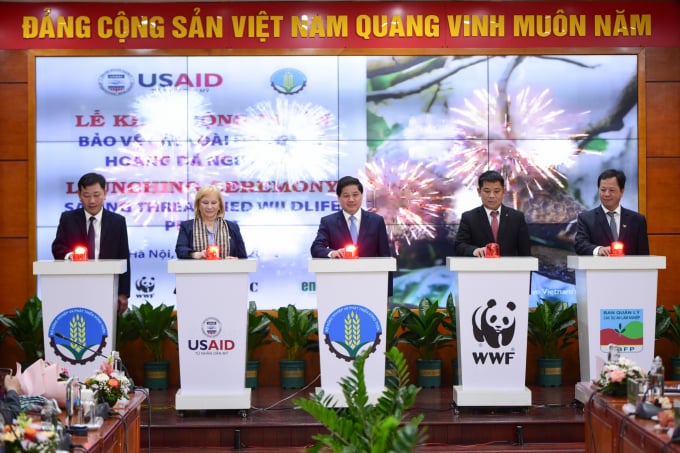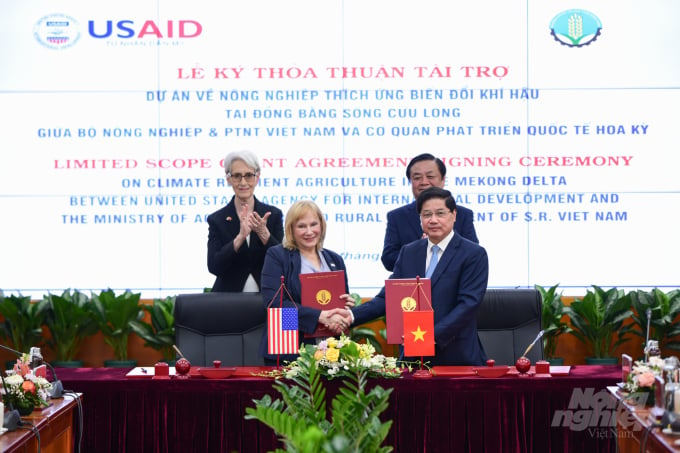June 19, 2025 | 06:50 GMT +7
June 19, 2025 | 06:50 GMT +7
Hotline: 0913.378.918
June 19, 2025 | 06:50 GMT +7
Hotline: 0913.378.918

The "Saving Threatened Wildlife" project was kicked off on June 13. Photo: Tung Dinh.
The 5-year project "Saving Threatened Wildlife" aims to help Vietnam control the serious wildlife trafficking situation and strengthen leadership capacity in tackling crimes relating to wildlife.
It also has a goal to foster commitment among central and local leaders, improve law enforcement efficiency, and reduce demand for consumption of illegal wildlife products.
MARD Deputy Minister Le Quoc Doanh said: “In recent times, along with the Government's efforts in fighting and preventing wildlife crimes, Vietnam has also received a lot of support and effective cooperation from the international community, including the USAID."
Affirming that Vietnamese authorities have considered the illegal trade and consumption of wild animals as one of the challenges for biodiversity conservation, the Deputy Minister added that Vietnam had been actively and responsibly participating in activities to conserve biodiversity and combat illegal wildlife trade.

MARD has been successfully cooperating with US organizations. Photo: Tung Dinh.
Speaking about the project "Saving Threatened Wildlife", Deputy Minister Doanh confirmed that the project's success would importantly contribute to the implementation of the sector's tasks and moreover, show the highest commitments of the Vietnamese Government in combating wildlife trafficking to prevent biodiversity loss in the country as well as in the world.
USAID Vietnam Mission Director Ann Marie Yastishock said at a launching ceremony on June 16 that through this new project, USAID would work with the MARD to reduce demand for illegal wildlife products and boost the protection of endangered wildlife.
According to her, experts forecast that, at the current rate, the world's most threatened iconic animals such as rhinos, elephants, pangolins, and tigers will disappear from our planet within the next few decades.
Therefore, the project will focus on protecting species that are at risk of being trafficked internationally into Vietnam such as African rhinoceros, African and Asian elephants, and pangolins, as well as others that are regularly trafficked, hunted and traded domestically and internationally including primates, roe deers and large cats.
Also on June 13, USAID and the MARD signed the first bilateral partnership agreement called a Limited Scope Grant Agreement on climate change cooperation in the Mekong Delta for the period 2022-2027.

Deputy Minister Le Quoc Doanh and USAID Vietnam Director Yastishock signed an agreement on cooperation to respond to climate change in the Mekong Delta. Photo: Tung Dinh.
MARD Minister Le Minh Hoan and US Deputy Secretary of State Wendy Sherman witnessed the signing ceremony of the agreement.
With an estimated budget of up to USD50 million, through this agreement, USAID will help MARD in reducing methane emissions from the agriculture sector, building resilience for the Mekong Delta’s vulnerable populations, promoting nature-based solutions, and developing climate-resilient and low-emissions policies.
Minister Le Minh Hoan emphasized that Vietnam always recognizes and thanks the US for its support and assistance to Vietnam by annually sponsoring tens of millions of dollars for the agriculture and rural development industry to implement projects on science and technology cooperation in the fields of disease control, climate change adaptation, high tech application, biodiversity conservation, research, experiment and application of vaccine for African swine fever.
In addition, Vietnam highly appreciates the cooperation and support of the US in the process of Vietnam's agriculture and rural development through policy consulting programs to perfect laws and regulations.
Meanwhile, speaking at the signing ceremony, US Deputy Secretary of State Wendy Sherman highly appreciated the cooperation relationship between USAID and the MARD in efforts to help people in the Mekong Delta to adapt to climate change and reduce emissions in agriculture.
According to her, solving the climate crisis must be a collective effort that should cover all areas, from enhancing environmental resilience to reducing emissions and conserving biodiversity.
Translated by Trang Nguyen

(VAN) To address plastic pollution, closing the plastic recycling cycle will bring significant economic and environmental benefits.

(VAN) According to the Binh Thuan Department of Industry and Trade, in the first five months of 2025, Binh Thuan's dragon fruit export turnover increased by 20.65% compared to the same period last year.

(VAN) EU countries on Thursday gave final approval to new tariffs on fertilizer imports from Russia, a move aimed at cutting off revenue that could support Moscow’s war in Ukraine, despite concerns from European farmers.

(VAN) The working delegation from the Ministry of Agriculture and Environment conducted an important trip to the Netherlands to strengthen strategic partnerships and sustainable development in the agricultural sector.

(VAN) The letter ‘A Plea from the Ocean’ not only evokes emotion but also awakens the human conscience to the responsibility of protecting life on Earth.

(VAN) The Department of Agriculture in South Africa has announced the country’s first mass vaccination of poultry to prevent local birds from contracting avian influenza.

(VAN) Establishment of the Mekong Delta Regional Agricultural Linkage Center, aiming for a closed value chain, deep processing, trading platforms, and international market connectivity.